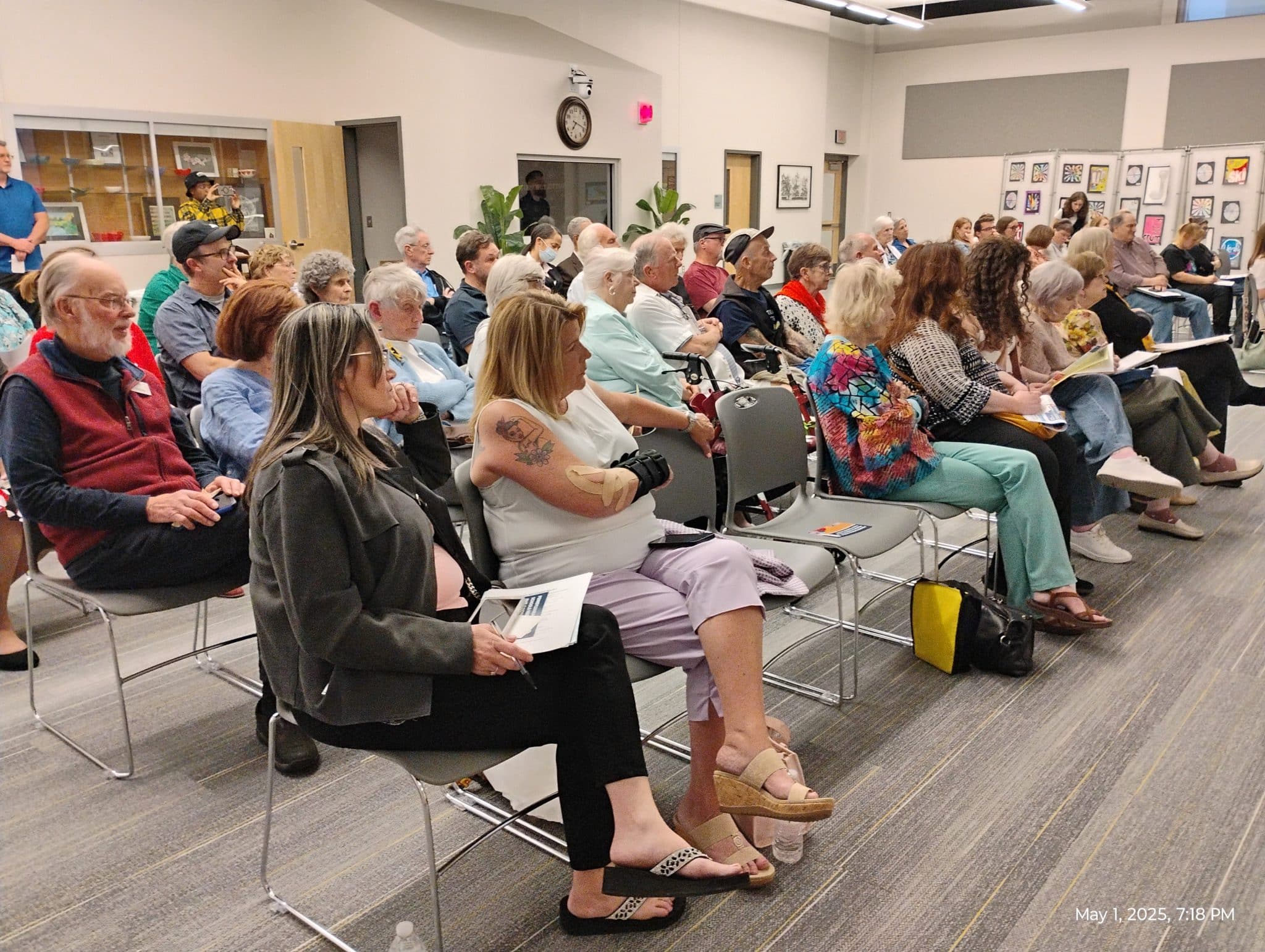Bristol community members and Bucks County residents learned more about the status of state funding for still economically struggling public schools, specifically for Bristol Township and other local underfunded districts at a community forum Thursday evening.
Held in the Bristol Township School Administration Building, the event was hosted by POWER Interfaith Bucks and Children First and was advertised with a mission to “advocate for full and fair funding for Pennsylvania’s public schools” as “the state continues to underfund its schools.” The speakers included PA State Representatives Tina Davis and Jim Prokopiak, Bristol Township Assistant Superintendent Chris Polzer, Rev. Bill Bloom of the United Christian Church of Levittown, and Children First K-12 Education Policy Director Priyanka Reyes-Kaura. POWER Interfaith’s Melody Katz moderated the discussion.
The issue of public school underfunding in Bucks County and statewide stretches back to 2011. While schools were already underfunded, the PA state legislature abandoned the “Basic Education Funding” formula and cut more than $860 million worth of funding. In 2014, multiple parties including the Education Law Center, six school districts, seven parents, and the local NAACP filed a joint lawsuit to force the state legislature to comply with a line in the state constitution laying out a “thorough and efficient system of public education.”
In 2023, the Commonwealth Court ruled that PA’s school funding system is unconstitutional and must be reformed. In an opinion, Judge Jubelirer explained that because the state provides only one- third of all public school funding and relies mostly on local property taxes, students in school districts with lower property values and incomes do not receive the same level of resources in their education.
Referencing the court decision, panelist Reyes-Kaura said the school funding system is still unconstitutional and funding increases need to be expedited.
“If you read the news a lot last year, you might have seen that we made history with the largest state [funding] increase ever. However, it only filled 11 percent of the total gap in funding that our schools need,” Reyes-Kaura said. “What we’re asking is for the next 11 percent of what’s called the adequacy gap, which would go towards 348 districts across the state and five school districts here in Bucks County including Bristol Township, Bensalem, Pennridge, and Neshaminy–all of which have adequacy gaps.”
The 2024-2025 “historic budget” Governor Josh Shapiro unraveled allocated a $1.1 billion increase for K-12 public education funding, equating to a $567 million to be distributed through the Basic Education Funding Formula to close the equity gap. It introduced a new funding stream called the adequacy supplement delivered to 70 percent of school districts aiming for poorer districts to spend a target amount of money to meet adequate education resources. In 2024, the state gave districts $494 million in adequacy supplements which filled 11 percent of the adequacy gap. The state has yet to commit to a timeline for fully closing the $4 billion adequacy gap in a reasonable number of years.
As one of the poorest municipalities in Bucks County, Bristol Township was one of the 11 school districts to receive an additional amount of funding to achieve adequacy levels. However, Bristol Township School District Assistant Superintendent Polzer said it was hardly enough.
“I’m not a negative person, but I do have to tell you that increase doesn’t go towards new anything. Really, that increase goes towards just keeping the lights on,” Polzer said.
Bristol Township’s increase in funding, according to Polzer, equaled about $4 million, or just 2 percent of their overall budget. Additionally, Polzer said they only received their finalized budget in mid-July while it was due by June 30th.
Polzer also explained that the increase in funding did not keep up with inflation, and costs are rising–especially the cost of employees which is 70 percent of Bristol’s budget. Polzer said that according to the Independent Fiscal Office, districts should expect to have a lower Act 1 Index rate each year, meaning schools will not be able to raise as many funds through taxes even though Bristol has been operating in a $10 million deficit this year.
“Honest to gosh truth, this is a school district. It’s a business. There is no business that can continue to operate in a deficit year after year without eventually getting to a breaking point where you’re raising taxes or letting off your staff,” Polzer said. “If I’m ever in a situation where I have a deficit I can’t close, we’re talking about loss of staff at that point.”
Even so, raising taxes would not be the ideal situation for Bristol Township. James P. Morgan, the Bristol Township School Board President, said Bristol hasn’t raised taxes in 6 years, and seniors in the area would likely not be able to afford another $10 per month.
“We have no buses in our district. We have no AP classes, no honors classes. There’s very limited resources for special education and school counselors.” – Morrisville School District parent Kevin Subers
“We’re talking raising taxes 2, 3, 4, 5 percent, $40, $50 a month. That would hit me hard. That would hit everybody in this room hard,” Morgan said. “I don’t want to cut services. Where am I going to get this money? That’s the question that needs to be answered.”
One of the answers, as explained by many panelists, is cyber charter school reform. Cyber charter schools are currently funded the same as “brick and mortar” charter schools. An audit of 5 charter schools released by Auditor General DeFoor in February shows that from 2020-2023, the schools legally increased revenues by $425 million due to the outdated funding formula. These schools used taxpayer dollars on staff bonuses, gift cards, vehicle payments, fuel stipends, and the renovation of twenty-one buildings, despite them being online schools.
Democratic State Rep. Prokopiak, who represents the 140th district in lower Bucks and is a member of the House Education Committee, said that the committee has been working to address cyber charter reform, along with education funding with the appropriations committee teacher certification to address teacher shortages.
Speaking to the Beacon, Prokopiak said the bill, introduced by State Rep. Mary Isaacson (D-Philadelphia), aims to cap the amount of money allocated to cyber charters, create statewide uniform funding total that a cyber charter would be paid per student, ensuring they don’t have unlimited fund balances, and provide more accountability. Prokopiak said the education committee will vote on the bill in about two weeks, and estimates the state house of representatives will vote on it by June. He explained that the bill will allow PA to catch up with other states on the issue.
“Other states have said we’re gonna cap [cyber charter school funding] because they don’t have transportation costs, they don’t have facilities costs, so it should be cheaper for them. We have not done that yet,” Prokopiak said.
State Rep. Davis, a Democrat serving the 141st district which includes Bristol, said that the cyber charter reform bill will cap state funding for cyber charters at $8,000 per student, require all cyber charter school districts to have this same rate, and ensure funding is being funneled directly to the education of the students. Davis said this legislation will save Bucks County residents $8 million in total taxpayer dollars.
In the Q&A session, audience members asked about the general effect the Trump administration will have on education funding in states. Representative Prokopiak responded saying “we have no idea what is going on” and representatives in Washington generally do not either. Representative Davis has asked lobbyists their actions in dealing with the new administration and told her they have operated as usual, hoping the level of funding remains.
In response to the same question, Polzer said since the 50th anniversary of the IDEA Act is coming up later this year with its goals far from being accomplished, now would be a good time to call out the federal government in terms of the state funding of education.
“If you look back at the law, there was a step-up plan for an increase in funding from 5 percent, 10 percent, 20 percent, 30 percent, and 40 percent, but yet we’re only sitting at 15 percent funding,” Polzer said. “This would be an appropriate time to beat up the Fed and say we’re looking at 50 years of broken promises and it’s about time you get to your 40 percent funding.”
Reyes-Kaura said Children First holds what they call “caravan days” where the organization will provide transportation to Harrisburg and schedule meetings to speak with lawmakers. Additionally, on May 16th, the organization is holding a day of action in Washington D.C. to urge congress to oppose any cuts to Head Start.
After the event, attendee Kevin Subers, a social worker from Morrisville Borough, spoke to the Beacon about the Morrisville School District being “chronically underfunded.” Subers said he pulled his 13-year-old son out of the public school and is now paying tuition for Holy Trinity School, despite it being an “incredible financial burden” on their family.
“We have no buses in our district. We have no AP classes, no honors classes. There’s very limited resources for special education and school counselors,” Subers said. “If the state would only fund education, parents may not have to make the choice of sending their kids to private school because the public school system is not meeting the needs of our students.”







